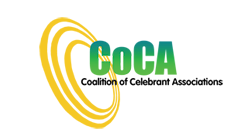- to put the client’s needs or some other authority’s needs before their own,
- to be able to offer impartial advice, and
- to not use the relationship developed in their other work, where power relationships have developed (ie where free and informed consent is hampered) for financial or other benefit. See the Wikipedia references below.
- to use business skills for the efficient and effective management of their professional independent celebrancy practice, but not to exploit their professional role to offer unnecessary or unrelated products or services.*
(Yes marriage celebrants, like other professionals need business skills, but that does not make them “just a business”.)
NB Conflict of Interest is not an issue for businesses, where it’s “buyer beware”.
There appears to be 6 main principles to apply in making a decision about Conflict of Interest:
- The benefit from another activity may outweigh the benefit to the public of the celebrant role (esp. financially).Thus the celebrant could be tempted to take shortcuts or to act illegally.
For example; $ 2,000 profit from a reception booking vs $500 for the wedding. Thus back- dating; not checking documents thoroughly etc. may be a way of securing the booking. - A professional is expected to be impartial in advice/ service giving. Thus the celebrant needs to be at arm’s length to related activities.For example; The celebrant is the Function Manager at an RSL Club or owner of reception house. The celebrant may receive a commission for every wedding reception referred to the Club or Reception House, and thus promotes that function centre over another – when the couple’s expectation is that they are receiving “impartial” advice.
Having relatives or friends in the wedding industry can make the task of being “impartial” very difficult eg advice giving about other wedding related services Here the rewards may not be financial – it may be peace of mind that your son or daughter is in a secure job. Though it could be financial – ie if they don’t have employment then the celebrant may have to support them. - Free and informed consent to choose any celebrant could be hampered by the actions of the celebrant’s other activities.For example, where a celebrant works for a company providing wedding services and the celebrant’s services are part of the wedding package. The classic example is where the holiday resort / island will only allows “its own” celebrants to be part of their wedding package.They may also charge more, when “their celebrants” are not used, effectively giving a “bribe” to take theirs. Such celebrants then can be pressured to back-dating; not check documents thoroughly etc. for fear of losing that work. This concept of a “bribe” – choose your floral needs from my florist business (car hire, catering, hair-dressing etc) and I’ll give you a discount on being your wedding celebrant, ie the couple is not really ‘free to choose’ because they are being bribed to do otherwise. And thus as Guideline 1 the celebrant may take shortcuts or act illegally.
- A professional is expected to have some altruistic motive involved in their work.Being in service to others and / or to one’s community is the common thread in professions, not doing work “just for the money”. Giving referral advice about relationship education, and resources for a fulfilling marriage are part of the marriage celebrants’ role. Thus less altruistic rewards from other wedding related work could undermine this aspect of the Marriage Celebrant’s role.
- The celebrant’s other activities or roles may impact on their ability to fully and competently prepare and deliver the marriage ceremony.Related wedding activities are more likely to affect the celebrant’s role as they often occur near the time of the wedding. For example, playing the harp may mean not being able to see all the guests and thus, not to be alerted to the fact that one of the witnesses has left to go to the toilet. Driving the limousine or doing photographs before the wedding, increases the chances of being late, and distracted from concentrating on one’s pre-ceremony tasks, like checking all the paperwork etc.
- The other activities of the professionals can harm the public perception of the impartiality of the profession.If the Government continues to appoint people who own or are employed by wedding related businesses, then the public confidence in the impartiality of marriage celebrant services is likely to fall. Whether we like it or not, the wedding industry is viewed as “money” oriented – recent studies showed that the price of the same services / product rose, if the word “wedding” came into the quote.
For example, clergy do other counselling services, marriage preparation, values and ethics education, pastoral care, teaching etc.
If a line needs to be drawn somewhere, we need to model “Marriage Celebrancy” on the Clergy, not Small Business, nor the Law.
Divinity, like Law, is one of the oldest “professions”. See below.
For the long term common good of our professional development, the civil celebrant needs to be more aligned with the clergy than with lawyers – who these days are seen as a rather “money” oriented lot.
The Regulation Impact Statement coming from a “Law” perspective aligns civil celebrants with the “Migrant Agents” perhaps because the Attorney General Department is focused upon matters of law.
However, the beauty of the marriage ceremony is primarily about the celebration of “love”, (clergy) not about being tied up in knots about the legal words (lawyers).
It is “love” that is the focus of the celebrants work – whether one has a “God is Love” focus as the religious clergy do, or whether is the “Love of one’s fellow human being” as the humanitarians do.
CoCA has already submitted a paper on its Position of Conflict of interest in response to a request for comment from the Marriage Law and Celebrant Section.
- Ensuring stricter Conflict of Interest Guidelines would increase professionalism and decrease the number of people entering celebrancy, who assume they can combine a wedding related industry function with being a marriage celebrant.
- In turn, well publicized clearer guidelines should assist in reducing the MLCS workload in doing individual determinations on every application.
Read more … see TABLE OF CONTENTS
* This sentence added later to better express the point being made.


